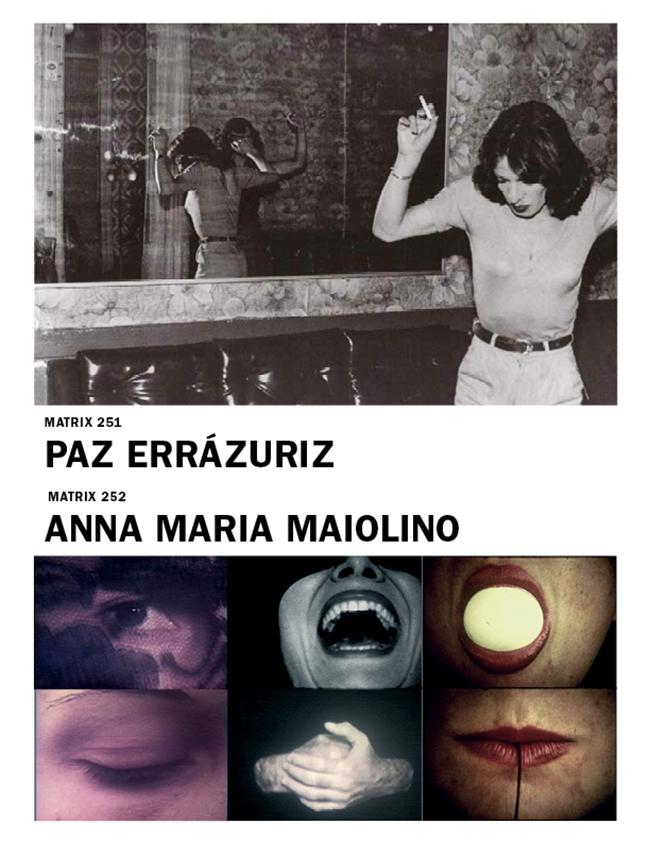
PAZ ERRAZURIZ MATRIX 251, ANNA MARIA MAIOLINO MATRIX 252 AT BAM/PFA
FROM 17 JANUARY TO MARCH 30, 2014
Top: Paz Errázuriz: La Palmera, Santiago, from the series La manzana de Adán, 1982.
| ||
From January 17 through March 30, 2014University of California, Berkeley Art Museum and Pacific Film Archive (BAM/PFA) presents two exhibitions: •• Paz Errázuriz / MATRIX 251
Chilean photographer Paz Errázuriz, who has been living and working in Santiago since the 1960s, is known for her honest portrayal of people living on the fringes of society. This presentation, her first solo museum exhibition in the U.S., showcases selections from two bodies of work made during the brutal military dictatorship of Augusto Pinochet, which lasted from 1973 to 1990. From 1982 to 1987, Errázuriz documented the daily lives of a dozen male transvestites who worked in various brothels in the cities of Santiago and Talca. Enshrouded in silence and having suffered in a secret, violent world, the men welcomed Errázuriz’s camera, and wanted their stories to be told. The resulting series La manzana de Adán (1982–87) was originally exhibited just before the Pinochet regime toppled in 1990, and shortly thereafter an accompanying book was published in collaboration with journalist Claudia Donoso. In Boxeadores (1987), Errázuriz turns her camera to a different group of men: boxers who fought in neighborhood gymnasiums. Her moving portraits of young men, all shot isolated against a wall, reveal a masculinity defined by sport, but also rooted in a particular community and social space. •• Anna Maria Maiolino / MATRIX 252
http://bampfa.berkeley.edu/exhibition/252 MATRIX 252 presents a selection of videos by Săo Paulo–based artist Anna Maria Maiolino, whose multidisciplinary practice has over the past half-century explored the viscerality of embodied experience, often obliquely through fragmentation and abstraction. Born in Italy, Maiolino moved to Brazil in 1960, living first in Rio de Janeiro where she became involved with the various artistic movements of the time—New Figuration, Neo-Concretism, and New Brazilian Objectivity—working closely alongside artists such as Lygia Clark, Antonio Dias, Hélio Oiticica, and Lygia Pape. By the 1970s, when artists were engaging with the social and political issues of their time, the Brazilian military dictatorship (which assumed power in 1964 and lasted for over twenty years) had reached its bleakest period, and its resultant brutality became a subject for Maiolino’s work. This exhibition features a group of four videos, originally shot on Super 8 film, from the 1970s and early 1980s that use the body to express the experience of living under an oppressive regime. MATRIX 251 and 252 are organized by by Apsara DiQuinzio, curator of modern and contemporary art and Phyllis C. Wattis MATRIX Curator.
| ||
|
UC BERKELEY ART MUSEUM AND PACIFIC FILM ARCHIVE
2625 Durant Ave. Berkeley, CA 94720
INFORMATION: • Phone: 5106420808 • Website: http://bampfa.berkeley.edu • Mail : bampfa@berkeley.edu CURATORS: Apsara DiQuinzio, curator of modern and contemporary art and Phyllis C. Wattis MATRIX Curator. OPENING TIMES: Wednesdays through Sundays; 11 a.m. to 5 p.m. ADMISSION PRICE: ($0-$10)
|
||

